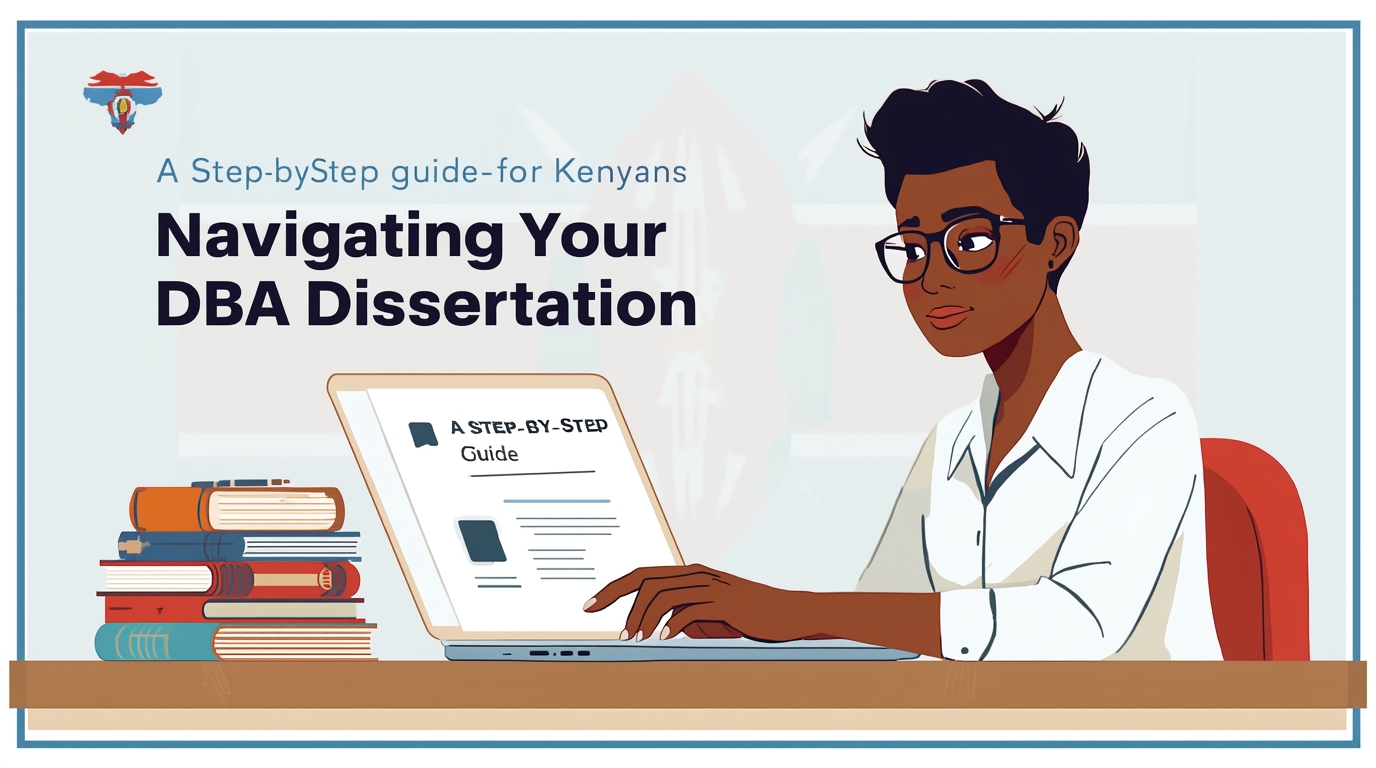For many Kenyan professionals, a Doctor of Business Administration (DBA) is the pinnacle of their academic and professional journey. It’s a testament to their dedication, expertise, and desire to make a significant impact in the business world. However, the dissertation, the culmination of the DBA program, can be a daunting prospect. This comprehensive guide will provide you with a step-by-step approach to navigating your DBA dissertation, with specific insights for the Kenyan context.
Understanding the DBA Dissertation
First and foremost, it’s crucial to understand what a DBA dissertation is and how it differs from a traditional Ph.D. thesis. While both are doctoral-level research projects, a DBA dissertation is focused on practical application. It’s about applying existing theories to solve real-world business problems. In contrast, a Ph.D. thesis is typically more theoretical, aiming to create new knowledge and contribute to academic discourse.
For Kenyan DBA candidates, this distinction is particularly relevant. The Kenyan business landscape is dynamic and presents a myriad of challenges and opportunities. Your DBA dissertation is a chance to address these issues head-on, providing actionable solutions that can drive innovation and growth in your organization and the wider economy.
A Step-by-Step Guide to Your DBA Dissertation
The dissertation journey can be broken down into several manageable steps. Here’s a roadmap to guide you through the process:
Step 1: Choosing a Relevant Research Topic
This is arguably the most critical step in your dissertation journey. Your research topic should be:
- Relevant to your field and the Kenyan context: Choose a topic that addresses a pressing business problem in Kenya. This will not only make your research more impactful but also ensure you remain motivated throughout the process.
- Feasible to research: Consider the availability of data, resources, and your own expertise. A topic that is too broad or too niche may be difficult to research effectively.
- Aligned with your career goals: Your dissertation can be a stepping stone to your next career move. Choose a topic that will position you as an expert in your desired field.
Tip for Kenyan students: Consider topics that are relevant to Kenya’s Vision 2030, the Big Four Agenda, or the growing digital economy.
Step 2: Developing a Compelling Research Proposal
Your research proposal is the blueprint for your dissertation. It should clearly outline your research question, objectives, methodology, and expected outcomes. A strong research proposal will not only impress your supervisor but also provide you with a clear roadmap for your research.
Your proposal should include:
- Introduction: Provide a brief overview of your research topic and its significance.
- Literature Review: Summarize the existing research on your topic and identify the gaps that your research will address.
- Methodology: Describe the research methods you will use to collect and analyze data.
- Timeline: Create a realistic timeline for completing your dissertation.
Step 3: Conducting a Comprehensive Literature Review
The literature review is a critical component of your dissertation. It demonstrates your understanding of the existing research on your topic and helps you to identify the theoretical framework for your study.
Tip for Kenyan students: Don’t limit your literature review to international journals. Explore local research from Kenyan universities and research institutions to gain a deeper understanding of the local context.
Step 4: Designing a Robust Research Methodology
Your research methodology should be aligned with your research question and objectives. You can choose from a variety of research methods, including:
- Qualitative research: This involves collecting and analyzing non-numerical data, such as interviews, focus groups, and case studies.
- Quantitative research: This involves collecting and analyzing numerical data, such as surveys and experiments.
- Mixed-methods research: This combines both qualitative and quantitative research methods.
Tip for Kenyan students: Consider using a case study approach to explore a specific business problem in a Kenyan organization.
Step 5: Data Collection and Analysis
This is where you will put your research methodology into practice. Be sure to collect and analyze your data systematically and ethically.
Tip for Kenyan students: Leverage your professional network to gain access to data and research participants.
Step 6: Writing and Structuring the Dissertation
Your dissertation should be well-structured and clearly written. A typical DBA dissertation includes the following chapters:
- Chapter 1: Introduction
- Chapter 2: Literature Review
- Chapter 3: Methodology
- Chapter 4: Findings
- Chapter 5: Discussion and Conclusion
Tip for Kenyan students: Use clear and concise language. Avoid jargon and explain technical terms clearly.
Step 7: The Viva Voce (Oral Defense)
The viva voce is the final step in your dissertation journey. It’s an oral examination where you will defend your research in front of a panel of experts.
Tip for Kenyan students: Practice your presentation beforehand and be prepared to answer challenging questions.
Tips for Success
Here are some additional tips to help you succeed in your DBA dissertation journey:
- Find the right supervisor: Your supervisor will be your guide and mentor throughout the dissertation process. Choose someone who is an expert in your field and with whom you have a good rapport.
- Manage your time effectively: A DBA dissertation is a marathon, not a sprint. Create a realistic timeline and stick to it.
- Stay motivated: There will be times when you feel overwhelmed. Stay focused on your goals and celebrate your achievements along the way.
- Seek support: Don’t be afraid to ask for help from your supervisor, colleagues, or family.
- Take care of yourself: Your physical and mental health are important. Make sure to get enough sleep, eat well, and exercise regularly.
The American Imperial University Advantage
For Kenyan professionals looking to embark on their DBA journey, the American Imperial University (AIU) offers a globally recognized program with a dissertation support system designed for success. With one-on-one supervision from experienced faculty, a personalized “research buddy” service, and access to AI-driven research tools, AIU equips you with the resources and guidance needed to excel. The program’s flexible, weekend-based online learning format is tailored for working professionals, and the 36-month timeline (with a fast-track option) provides a clear path to completion.
Navigating a DBA dissertation is a challenging but rewarding journey. By following these steps and tips, you can successfully complete your dissertation and achieve your academic and professional goals. Remember, your DBA dissertation is more than just an academic requirement; it’s an opportunity to make a real-world impact and contribute to the growth and development of the Kenyan business landscape. Good luck!
Frequently Asked Questions
What is the main difference between a DBA dissertation and a PhD thesis?
The primary difference lies in their focus. A PhD thesis aims to create new, original theoretical knowledge for academia. In contrast, a DBA dissertation is practical and applied; its goal is to use existing theories to solve a real-world business problem, creating actionable solutions for organizations.
How do I select a relevant DBA research topic in Kenya?
Your topic should be at the intersection of your passion, professional expertise, and a current issue within the Kenyan business environment. Focus on a problem you are genuinely interested in solving. Consider aligning your research with national economic priorities like Kenya’s Vision 2030 or challenges in growing sectors like fintech or agribusiness. Most importantly, ensure your topic is feasible in terms of data access and resources.
What exactly is a viva voce?
The viva voce (often just called a “viva”) is an oral examination and the final step of your DBA journey. You will present and defend your dissertation in front of a panel of academic experts. The purpose is to demonstrate your deep understanding of your research, justify your methodology, and prove the originality and significance of your work. Preparation is key: know your thesis inside and out and practice answering potential questions.
How long does the dissertation phase of a DBA program usually take?
The dissertation phase typically takes up the final year or more of a DBA program. For instance, in a 36-month program like the one at American Imperial University, the third year is dedicated to the dissertation. However, the exact duration can vary based on the program’s structure, the complexity of your research, and your personal progress. Many universities offer extensions if you need more time.
What kind of support can I expect while writing my dissertation?
Reputable DBA programs offer a robust support system. You will be assigned a supervisor who is an expert in your field and will act as your primary mentor. Beyond that, universities often provide resources like access to extensive digital libraries, research methodology workshops, and statistical software. Some, like American Imperial University, even offer personalized guidance services like a “research buddy” and AI-driven tools to assist you at every stage.




